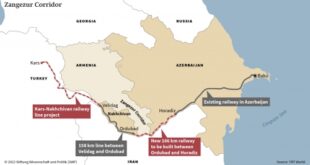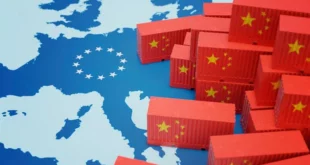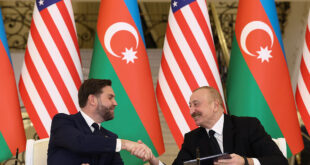 Dmitry Medvedev, Russia’s president, has ordered the military to cease its operations in Georgia and the breakaway regions of South Osetia and Abkhazia, according to the Kremlin.But Georgia’s prime minister has said on Tuesday that Tbilisi would need to see a signed peace deal before it would acknowledge any ceasefire.
Dmitry Medvedev, Russia’s president, has ordered the military to cease its operations in Georgia and the breakaway regions of South Osetia and Abkhazia, according to the Kremlin.But Georgia’s prime minister has said on Tuesday that Tbilisi would need to see a signed peace deal before it would acknowledge any ceasefire.
Â
“We will need more evidence, everyone in this situation needs a signed binding agreement,” Lado Gurgenidze told the Reuters news agency.
Â
“Until that happens we are mobilised, we are prepared for everything … there has been more damage to infrastructure and civilian casualties today.”
Â
Medvedev gave the order as Nicolas Sarkozy, the French president, arrived in the capital Moscow in an attempt to secure a ceasefire.
Â
“I have taken the decision to end the operation to force Georgian authorities into peace,” he said at a meeting with defence officials.
Â
“The purpose of the operation has been achieved … The security of our peacekeeping forces and the civilian population has been restored,” Medvedev said.
Â
“The aggressor has been punished and suffered significant losses.”
Â
Advance halted
Â
Temur Yakobashvili, Georgia’s reintegration minister, confirmed that the Russian advance had stopped, but he said that troops were not withdrawing.
Â
“The Russians have halted their advance. There is no movement of Russian forces, but they are staying at their occupied positions,” he said in a televised statement.
Â
Michael Binyon, a Russia analyst with The Times newspaper, told Al Jazeera said he was surprised by the timing of the move.
Â
“It is clear that the Russian’s were waiting for international pressure to raise to a certain level, that they were then going to make their own decision based on their own assessment,” he said.
Â
“I would have thought they were going to let the outside world keep guessing for a little longer, particularly as president Sarkozy of France and various other mediators are on their way to Moscow to try to talk to them.
Â
“I think the Russian have also made their point – that they are the big power in the region and no one can tell them what to do.”
Â
Territorial integrity
Â
As he met Medvedev in Moscow, Sarkozy welcomed the order to end hostilities.
Â
“What you are saying is good news … It is now necessary to implement the ceasefire,” he said.
Â
Sarkozy said it was “normal” for Moscow to defend Russian-speaking people beyond its borders, but added that Georgia’s territorial integrity had to be respected.
Â
Al Jazeera’s Neave Barker, reporting from Moscow, said it was unclear what Russia means by a halt in operations.
Â
“They say they have achieved their strategic goals, to keep the peace, to restore order … but it is unclear how that fits in to the EU four-point plan of withdrawing troops to pre-operation levels,” he said.
Â
“Also within the EU treaty suggestion was the presence of peacekeeping troops on the ground from the OSCE [Organisation for Security and Co-operation in Europe] and UN, it’s going to be very difficult to ascertain, for the time being at least, what Russia’s response to an international presence will be.”
Â
‘Provocation’ warning
Â
A senior Russian military commander said that the ceasefire did not mean that all operations would be scrapped.
Â
“If we have received the order to cease fire, this does not mean that we have stopped all actions, including reconnaissance,” General Anatoly Nogovitsyn, deputy head of Russia’s general staff, said at a briefing.
Â
He said that Moscow was waiting for a response from Tbilisi and his forces would retaliate against any “provocation” from Georgian troops.
Â
Anatoly also denied that Russia had bombarded the town of Gori on Tuesday morning. A Dutch TV cameraman was reportedly killled and several civilians were injured as the town, about 60km from the capital Tbilisi, came under attack.
Â
However, Al Jazeera’s Alan Fisher witnesses the bombardment, which he said went on at regular intervals for at least two hours and hit both the town centre and Georgian military positions.
Â
Gurgenidze said in a televised statement early on Tuesday that the central square of Gori had been hit and university buildings were on fire.
Â
Georgian forces also came under attack from Russian-backed separatists in Abkhazia, launching a series of artillery strikes on the Kodori Gorge, the only part of the breakaway region Tbilisi still controls.
Â
Before Medvedev’s announcement Russia has resisted international calls for a ceasefire.
Â
Saakashvili condemned
Â
Just minutes earlier, Sergei Lavrov, Russia’s foreign minister, had said that the “only way” the conflict would end was with a Georgian withdrawal from the breakaway region of South Ossetia.
Â
He also called on Mikheil Saakashvili, Georgia’s president, to step down because Moscow would refuse to deal with him.
Â
“I don’t think Russia will feel like talking with Mr Saakashvili after what he did to our citizens,” Lavrov said.
Â
Russian forces moved into Georgian territory on Friday after the Georgian army launched an offensive to bring South Ossetia, which broke away in the early 1990s, back under government control. Russia says that 2,000 civilians have been killed.
Â
The United Nations refugee agency has said that the conflict in South Ossetia has displaced 100,000 people since it started late on Thursday.
Â
The UNHCR said numbers supplied by both the Georgian and Russian governments indicated that about 30,000 South Ossetians had moved into North Ossetia and up to 12,000 had been displaced within South Ossetia itself.
 Â
A few thousand have also fled south from South Ossetia into Georgia proper, while another 56,000 people from the Gori region in Georgia have been displaced, the UN agency said, quoting figures from Georgian officials.
Â
Source: Al Jazeera and agencies
Â
Kavkaz center
 Eurasia Press & News
Eurasia Press & News



